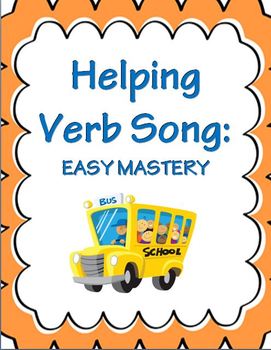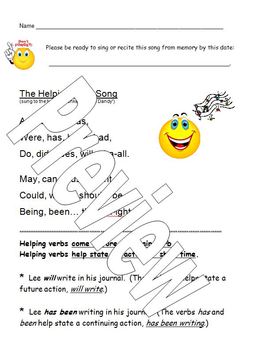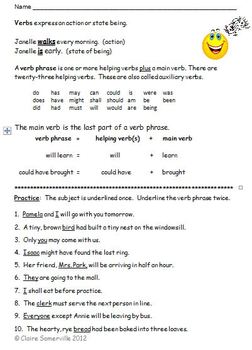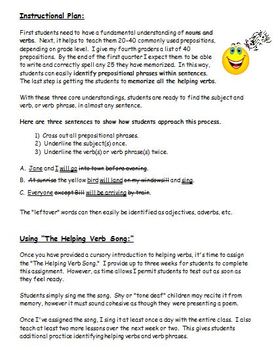Helping Verbs: Quick Mastery
Lessons4Now
3.9k Followers
Grade Levels
3rd - 5th
Subjects
Resource Type
Standards
CCSSL.3.1e
CCSSL.4.1
CCSSL.4.1b
CCSSL.4.1c
CCSSL.5.1
Formats Included
- PDF
Pages
5 pages
Lessons4Now
3.9k Followers
Description
For years my students have quickly memorized the helping verbs by singing the list to the tune of "Yankee Doodle Dandy." Once they've learned the song, students confidently recognize the 23 helping verbs and easily identify verb phrases in most any sentence.
This packet includes:
1) A song handout with a place to write in the due date at the top and a brief introductory lesson at the bottom.
2) A practice worksheet with a second mini-lesson on top and ten (10) sentences at the bottom for practice.
3) An assessment sheet where students fill in as many of the 23 helping verbs as they know. This can be used as a pre-assessment or during the memorization process to identify students who may need additional review. It can also be used as summative assessment in conjunction with singing "The Helping Verb" song or, in special circumstances, in lieu of singing the song.
Since I started using this method to teach the helping verbs, students seem to learn it more quickly. Even more exciting, each year there are more and more students who enter fourth grade eager to sing me the song during the first week of school. This is the effect of students from prior years robustly singing the song on the school busses and at home.
You'll be surprised how quickly your students will learn this difficult skill. Give it a try. It's easy. It's fun. Really.
IMPORTANT NOTE: This resource has been saved in a format that allows for printing in high resolution. However, file contents may NOT be changed, copied, or extracted. This file is NOT editable.
The CCSS incorporates the teaching of helping verbs (modal auxiliaries), into many lessons involving verb tense. Please note that this list may represent only a partial list of all standards and/or strands that apply.
CCSS.ELA-Literacy.L.3 Demonstrate command of the conventions of standard English grammar and usage when writing or speaking.
CCSS.ELA-Literacy.L.3.1e Form and use the simple (e.g., I walked; I walk; I will walk) verb tenses.
CCSS.ELA-Literacy.L.4.1 Demonstrate command of the conventions of standard English grammar and usage when writing or speaking.
CCSS.ELA-Literacy.L.4.1b Form and use the progressive (e.g., I was walking; I am walking; I will be walking) verb tenses.
CCSS.ELA-Literacy.L.4.1c Use modal auxiliaries (e.g., can, may, must) to convey various conditions.
CCSS.ELA-Literacy.L.5.1 Demonstrate command of the conventions of standard English grammar and usage when writing or speaking.
CCSS.ELA-Literacy.L.5.1b Form and use the perfect (e.g., I had walked; I have walked; I will have walked) verb tenses.
-> Please check out the preview to learn more about how well this product will meet your needs.
Thanks for stopping by to check out my products. If you like what you see and find it useful, PLEASE come back and leave me feedback. It would be greatly appreciated!
You might also like to check out these other ELA products:
Making Inferences Using Pictures
Persuasive/Opinion Paragraph Packet
Great Trick for Identifying Subjects and Verbs in a Sentence PowerPoint
Identifying Subjects & Verbs; Easy Mastery Using Prepositions & Prep. Phrases
Writing a Friendly Letter: Practice and Assessment
Summary Practice
Little House in the Big Woods Novel Packet {Easy to Grade! Print and Go!}
Follow me on Lessons4Now Facebook.
Follow me on Lessons4Now Pinterest.
Follow me on Lessons4Now Blog.
This packet includes:
1) A song handout with a place to write in the due date at the top and a brief introductory lesson at the bottom.
2) A practice worksheet with a second mini-lesson on top and ten (10) sentences at the bottom for practice.
3) An assessment sheet where students fill in as many of the 23 helping verbs as they know. This can be used as a pre-assessment or during the memorization process to identify students who may need additional review. It can also be used as summative assessment in conjunction with singing "The Helping Verb" song or, in special circumstances, in lieu of singing the song.
Since I started using this method to teach the helping verbs, students seem to learn it more quickly. Even more exciting, each year there are more and more students who enter fourth grade eager to sing me the song during the first week of school. This is the effect of students from prior years robustly singing the song on the school busses and at home.
You'll be surprised how quickly your students will learn this difficult skill. Give it a try. It's easy. It's fun. Really.
IMPORTANT NOTE: This resource has been saved in a format that allows for printing in high resolution. However, file contents may NOT be changed, copied, or extracted. This file is NOT editable.
The CCSS incorporates the teaching of helping verbs (modal auxiliaries), into many lessons involving verb tense. Please note that this list may represent only a partial list of all standards and/or strands that apply.
CCSS.ELA-Literacy.L.3 Demonstrate command of the conventions of standard English grammar and usage when writing or speaking.
CCSS.ELA-Literacy.L.3.1e Form and use the simple (e.g., I walked; I walk; I will walk) verb tenses.
CCSS.ELA-Literacy.L.4.1 Demonstrate command of the conventions of standard English grammar and usage when writing or speaking.
CCSS.ELA-Literacy.L.4.1b Form and use the progressive (e.g., I was walking; I am walking; I will be walking) verb tenses.
CCSS.ELA-Literacy.L.4.1c Use modal auxiliaries (e.g., can, may, must) to convey various conditions.
CCSS.ELA-Literacy.L.5.1 Demonstrate command of the conventions of standard English grammar and usage when writing or speaking.
CCSS.ELA-Literacy.L.5.1b Form and use the perfect (e.g., I had walked; I have walked; I will have walked) verb tenses.
-> Please check out the preview to learn more about how well this product will meet your needs.
Thanks for stopping by to check out my products. If you like what you see and find it useful, PLEASE come back and leave me feedback. It would be greatly appreciated!
You might also like to check out these other ELA products:
Making Inferences Using Pictures
Persuasive/Opinion Paragraph Packet
Great Trick for Identifying Subjects and Verbs in a Sentence PowerPoint
Identifying Subjects & Verbs; Easy Mastery Using Prepositions & Prep. Phrases
Writing a Friendly Letter: Practice and Assessment
Summary Practice
Little House in the Big Woods Novel Packet {Easy to Grade! Print and Go!}
Follow me on Lessons4Now Facebook.
Follow me on Lessons4Now Pinterest.
Follow me on Lessons4Now Blog.
Total Pages
5 pages
Answer Key
Included
Teaching Duration
90 minutes
Report this resource to TPT
Reported resources will be reviewed by our team. Report this resource to let us know if this resource violates TPT’s content guidelines.
Standards
to see state-specific standards (only available in the US).
CCSSL.3.1e
Form and use the simple (e.g., I walked; I walk; I will walk) verb tenses.
CCSSL.4.1
Demonstrate command of the conventions of standard English grammar and usage when writing or speaking.
CCSSL.4.1b
Form and use the progressive (e.g., I was walking; I am walking; I will be walking) verb tenses.
CCSSL.4.1c
Use modal auxiliaries (e.g., can, may, must) to convey various conditions.
CCSSL.5.1
Demonstrate command of the conventions of standard English grammar and usage when writing or speaking.





